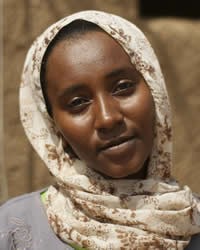Shaikia, Arabized in Sudan

Photo Source:
www.j-pics.info - Flickr
Creative Commons
|
Send Joshua Project a map of this people group.
|
| People Name: | Shaikia, Arabized |
| Country: | Sudan |
| 10/40 Window: | Yes |
| Population: | 1,211,000 |
| World Population: | 1,211,000 |
| Primary Language: | Arabic, Sudanese |
| Primary Religion: | Islam |
| Christian Adherents: | 3.00 % |
| Evangelicals: | 0.70 % |
| Scripture: | New Testament |
| Ministry Resources: | Yes |
| Jesus Film: | Yes |
| Audio Recordings: | Yes |
| People Cluster: | Arab, Sudan |
| Affinity Bloc: | Arab World |
| Progress Level: |
|
Introduction / History
The Arabs are one of the world's largest and most rapidly growing ethnic groups. In the seventh and eleventh centuries, Arabs invaded North Africa, causing many tribes and pre-Islamic Saharan nomadic groups to be displaced. These invasions also overran and absorbed, to some extent, the passive communities of black farmers, Jewish artists and Berber refugees who lived in and around the oases and trading centers of the northern desert. For this reason, many different Arab groups exist throughout North Africa today, including those tribes that have become "Arabized." One of the Arabized tribes is the Shaikia. Since they are culturally different from the Shaikia tribe, we'll call them Arabized Shaikia.
What Are Their Lives Like?
For most of the Arabized tribes, agriculture is the basis of the economy. Sorghum and millet are their staple crops, along with watermelons, gourds, okra, sesame and cotton. They also raise cattle, sheep, goats, donkeys and dogs. They make cheese and butter from the milk of both the cows and goats. Not all of the Arabized tribes are farmers. Some are livestock herders or merchants.
Most of the Arabized tribes live in permanent settlements or villages. Their houses are simple round huts with thatched roofs. The nomadic groups live in temporary camps due to their constant migrating tendencies. They usually live in dome-shaped shelters made of branches covered with grass. In the cities, where the few merchants and businessmen live, the houses are generally rectangular in shape and have tin roofs.
The Arabized Shaikia dress in similar fashion to those people of Arabic communities. They typically wear sandals, cotton turbans or caps and long-sleeved cotton tunics called djellabas. Their lives revolve around important ceremonies such as birth, marriage, death and the first haircut and circumcision for boys. The most elaborate of all ceremonies is the marriage ceremony.
Polygamy (having more than one wife) is a common practice among the Arabized tribes. However, according to Islamic law, a man cannot have more than four wives. After marriage, the newlywed couple generally lives with or near the husband's parents. However, in some groups, the young couple will live with the wife's family until after the birth of the first child.
What Are Their Beliefs?
With the death of Mohammed in A.D. 632, the Arabs erupted from the desert pastures of Arabia and overran the lands to the east and west. They intermarried with the local North African tribes and introduced them to Islam. The tribes began adopting the traditions and practices associated with Islamic culture. The spread of Islam continued and became even more advanced in the sixteenth and seventeenth centuries, when they founded many schools of religious learning. Today, virtually all of the Arabized tribes are 100% Muslim.
What Are Their Needs?
The majority of the Arabized tribes are not being ministered to by mission agencies, especially in Sudan. Further evangelistic work and much prayer are needed to penetrate the hearts of these precious people with the light of the gospel.
Prayer Points
Ask the Lord to call people who are willing to go to Sudan and minister truth to the Arabized Shaikia.
Pray that African Christians will be compelled to take the gospel to the Arabized Shaikia.
Ask God to strengthen, encourage and protect the small number Arabized Shaikia Christians.
Pray that Bibles, Christian broadcasts and other literature will be easily made available in the Sudanese Arabic language.
Ask the Lord to raise up Christian medical teams to work among the Arabized Shaikia people.